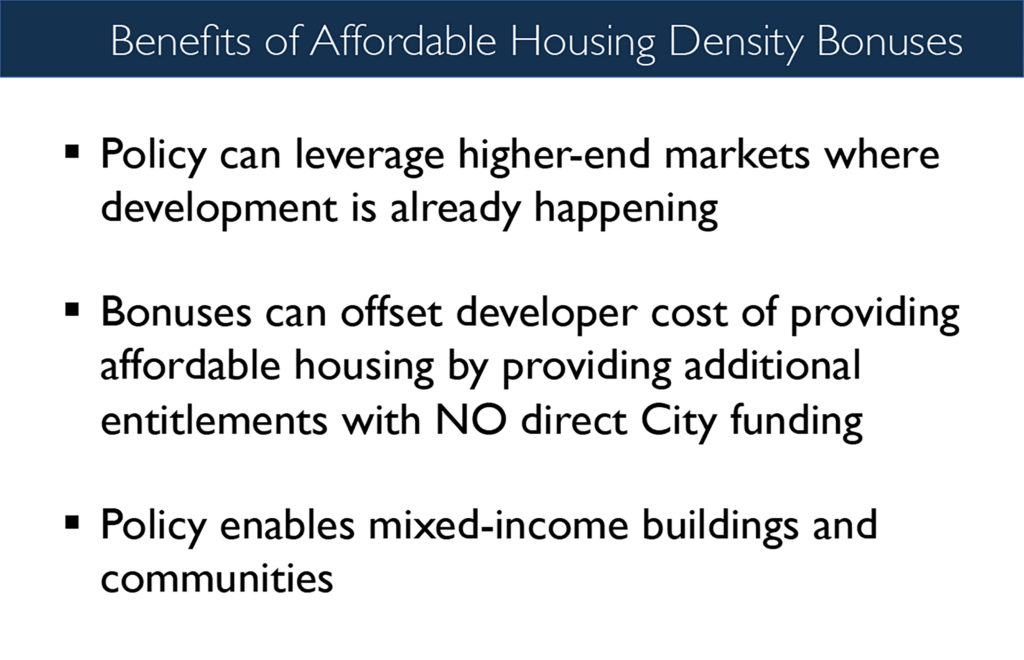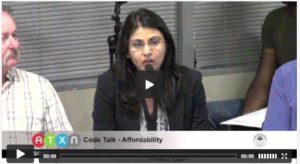
CodeNEXT Code Talk Affordability Panel
On May 8th, the City of Austin continued its series of “Code Talks” designed to focus on how CodeNEXT, the rewrite of the City’s Land Development Code can affect and improve priority issues. The topic of this night was affordability, a nagging problem for Austin, especially as it relates to housing. Not surprisingly, the event drew a standing room only crowd at the Town Lake Center.
HousingWorks Austin Executive Director Mandy De Mayo moderated the panel discussions and presentations. De Mayo opened with a dose of reality, informing the crowd that the Land Development Code rewrite alone will not solve our affordability issues. “It’s an incredibly complicated problem and requires multiple solutions,” said De Mayo.
As part of the program, City staff and CodeNEXT consultants gave presentations to show how the new Land Development Code can create more household affordability by creating more housing choices, by streamlining the permitting and review process for developers, and by adding more incentives for developers to create affordable units or pay a fee-in-lieu into the Housing Trust Fund. Also, concentrating more housing in zones that have easy access to public transit. Erica Leak with the City’s Neighborhood Housing and Community Development office also pointed out that the new Austin Strategic Housing Blueprint includes more than 60 strategies to help with affordability.
The panelists for the Code Talk included Jake Wegmann, an Assistant Professor at the UT School of Architecture, Shubhada Saxena, President and Founder of the South Asians’ International Volunteer Association (SAIVA), and Mark Rogers, Executive Director of Guadalupe Neighborhood Development Corporation (GNDC) who also serves on the board of HousingWorks Austin.
Citing statistics published by HousingWorks Austin, Wegmann noted that Austin had produced an average of 4,000 new affordable homes in the past couple of years, more than any other city in Texas and more than most major US cities. However, Wegmann said much more is needed. “We’re going to have to find ways to create more subsidized (legally restricted and affordable) housing and find ways to make it cheaper to build unsubsidized housing,” said Wegmann.
Mark Rogers works to build affordable housing in central East Austin. Rogers said because of current home prices, single-family homes are becoming an endangered species in Central Austin even for moderate households. Wegmann drew applause when he said the best thing Austin could do outside of more housing subsidy is to make it possible to build houses on smaller lots than we currently do. Rogers added the key isn’t necessarily smaller lots, but more units on those lots.

Source: Ian Carlton ECONorthwest
Shubhada Saxena is an advocate for the elderly through organizations like Family Eldercare. She proposed that neighborhoods carve out special zones for senior citizens that are more dense and have better access to support services. Saxena also said she has been researching co-live and co-work models where participants share spaces and costs. “Sometimes a senior citizen or someone else can make things more affordable by creating part of their home as a work space where they can sell things,” said Saxena.
Wegmann, a huge proponent of missing middle housing, said the City can do even more to allow residents to build Accessory Dwelling Units or ADU’s on their property. Wegmann said, “It’s much cheaper to carve an ADU (with a separate entrance) out of an existing house than it is to build a freestanding new house (on your property). That’s what I would really like to see.”
Toward the end of the program, the panel fielded questions submitted from the crowd. Questions focused on a variety of topics, including impacts of density, gentrification, and displacement. A big concern from attendees was whether developer incentives will only create affordable units for families or just one-bedroom and efficiency apartments. Consultant Abe Farkas of ECONorthwest said that doesn’t have to be the case. Farkas said, “You make family-sized units a requirement after you reach a certain number of affordable units.” Mark Rogers offered another solution. “If you did it instead of by number of units but by number of bedrooms so developers could get more credits for creating larger units that would incentivize large units.”
The program closed with De Mayo encouraging attendees to submit their comments about CodeNEXT by the July 7th deadline so they could be considered for the next draft of the Land Development Code. You can do so through the online comment tool on the City of Austin website.
